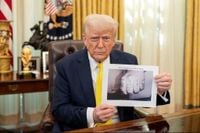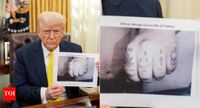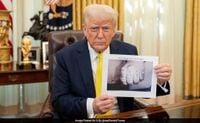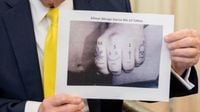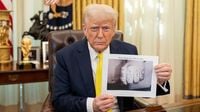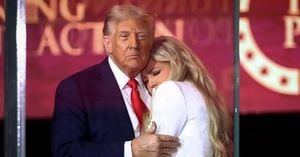In a controversial move, President Donald Trump has intensified his campaign against undocumented migrants by citing tattoos as evidence of gang affiliation, particularly focusing on Venezuelan immigrants. This approach has drawn sharp criticism from experts who argue that such practices are fundamentally flawed and misleading.
One recent case that has become a focal point in this debate is that of Kilmar Abrego Garcia, a 29-year-old Maryland resident who was deported to El Salvador on March 15, 2025. Trump highlighted Abrego Garcia's tattoos in a social media post, claiming they indicate membership in the notorious MS-13 gang. He stated, “This is the hand of the man that the Democrats feel should be brought back to the United States, because he is such ‘a fine and innocent person.’ They said he is not a member of MS-13, even though he’s got MS-13 tattooed on his knuckles... I must be allowed to do my job. MAKE AMERICA GREAT AGAIN!”
However, law enforcement officials and experts have warned against the reliance on tattoos as definitive proof of gang affiliation. Joseph Kenny, chief of detectives at the New York Police Department, emphasized that “a tattoo itself is never sufficient evidence to prove a person is a member of a criminal group.” This sentiment is echoed by other experts who point out that tattoos are prevalent in Venezuelan street culture and do not necessarily indicate gang membership.
Abrego Garcia's case has further polarized public opinion. A video investigation by The New York Times debunked viral theories suggesting his tattoos spelled out “MS-13” using a combination of symbols including a marijuana leaf, a smiley face, a cross, and a skull. In fact, ICE officials have stated they were unaware of any such symbols being linked to MS-13. Despite this, other tattoos cited in an ICE report, such as skulls with covered eyes, ears, and mouths, were presented as signs of seniority within the gang.
The legal ramifications of this case are significant. Despite a Supreme Court ruling that upheld a lower court’s order to reverse Abrego Garcia’s deportation, the White House has remained steadfast in its stance. Press Secretary Karoline Leavitt declared, “Abrego Garcia will never live in the United States of America,” alleging gang ties.
Adding to the complexity, El Salvador's President Nayib Bukele mocked claims of mistreatment, posting images of Abrego Garcia enjoying margaritas with Maryland Senator Chris Van Hollen. Bukele's post read, “Kilmar Abrego Garcia, miraculously risen from the ‘death camps’ & ‘torture,’ now sipping margaritas with Sen. Van Hollen.”
Legal experts caution that tattoos, while potentially indicative, are rarely used as standalone evidence in court. Ryan Brackley, an assistant district attorney in Colorado, stated, “A tattoo can be very telling. But are we going to base our decisions and law enforcement accusations and associations on a tattoo? Very, very unlikely.” Similarly, John Colello from Los Angeles County’s DA’s gang homicide division added, “Facts and context are obviously important. Tattoos alone, or lack of tattoo, do not necessarily mean a person is, or is not, a gang member.”
Abrego Garcia entered the U.S. illegally in 2012 and was granted a protective status in 2019 due to a well-founded fear of persecution from rival gangs. His lawyers argue that he has never been convicted of any crime, including gang membership, in either the U.S. or El Salvador. He has lived in the U.S. for 14 years, has three children, and worked in construction.
Despite these facts, Trump and his administration have continued to label him as a gang member. The legal battle surrounding Abrego Garcia's deportation has raised questions about the validity of the evidence used against him. In 2021, his wife, Jennifer Vasquez Sura, filed a protective order petition against him, alleging multiple instances of domestic violence. However, she later decided not to pursue the case, stating that they were able to resolve their issues privately.
On April 15, 2025, White House Press Secretary Leavitt also accused Abrego Garcia of human trafficking, referencing a past incident where he was stopped by a Tennessee highway patrol officer. However, this was related to a speeding violation, and no charges were filed against him.
Amidst the political fallout, Senator Van Hollen has been vocal in advocating for Abrego Garcia’s return. He traveled to El Salvador, where he met with Abrego Garcia and attempted to highlight the discrepancies in his treatment. Van Hollen stated, “Kilmar worked in construction and sometimes transported groups of workers between job sites, so it's entirely plausible he would have been pulled over while driving with others in the vehicle.”
The political implications of this case extend beyond Abrego Garcia himself. It has sparked a heated debate about immigration policy, the use of tattoos as evidence, and the broader implications of Trump's approach to undocumented migrants. Critics argue that such tactics are not only misleading but also dangerous, as they can lead to wrongful deportations and further stigmatization of immigrant communities.
As this case continues to unfold, the intersection of law enforcement, immigration policy, and community perceptions remains a critical area of concern. The reliance on tattoos as a marker of gang affiliation raises ethical questions about due process and the treatment of individuals within the immigration system.
In the end, the case of Kilmar Abrego Garcia highlights the complexities of immigration enforcement and the often fraught narratives that surround it. As the legal battles continue, it remains to be seen how the courts will ultimately rule on the validity of the evidence presented and the broader implications for immigration policy in the United States.

